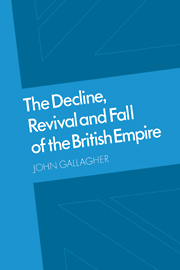The Imperialism of Free Trade
Published online by Cambridge University Press: 28 August 2009
Summary
It ought to be a commonplace that Great Britain during the nineteenth century expanded overseas by means of ‘informal empire’ as much as by acquiring dominion in the strict constitutional sense. For purposes of economic analysis it would clearly be unreal to define imperial history exclusively as the history of those colonies coloured red on the map. Nevertheless, almost all imperial history has been written on the assumption that the empire of formal dominion is historically comprehensible in itself and can be cut out of its context in British expansion and world politics. The conventional interpretation of the nineteenth-century empire continues to rest upon study of the formal empire alone, which is rather like judging the size and character of icebergs solely from the parts above the water-line.
The imperial historian, in fact, is very much at the mercy of his own particular concept of empire. By that, he decides what facts are of ‘imperial’ significance; his data are limited in the same way as his concept, and his final interpretation itself depends largely upon the scope of his hypothesis. Different hypotheses have led to conflicting conclusions. Since imperial historians are writing about different empires and since they are generalizing from eccentric or isolated aspects of them, it is hardly surprising that these historians sometimes contradict each other.
The orthodox view of nineteenth-century imperial history remains that laid down from the standpoint of the racial and legalistic concept which inspired the Imperial Federation movement.
- Type
- Chapter
- Information
- The Decline, Revival and Fall of the British EmpireThe Ford Lectures and Other Essays, pp. 1 - 18Publisher: Cambridge University PressPrint publication year: 1982
- 1
- Cited by



